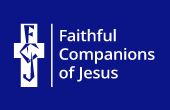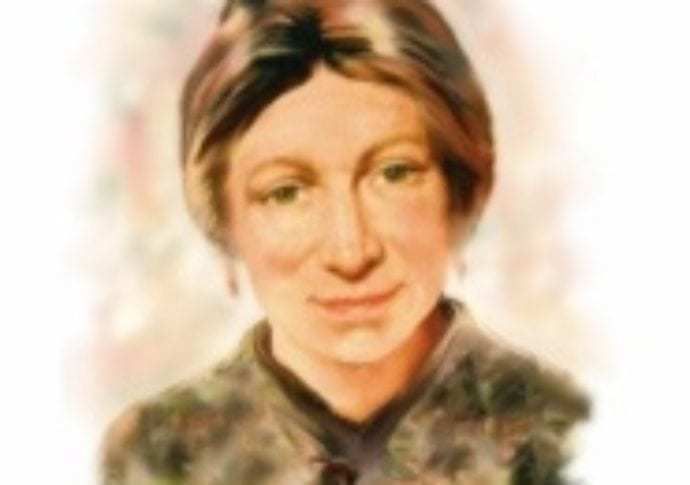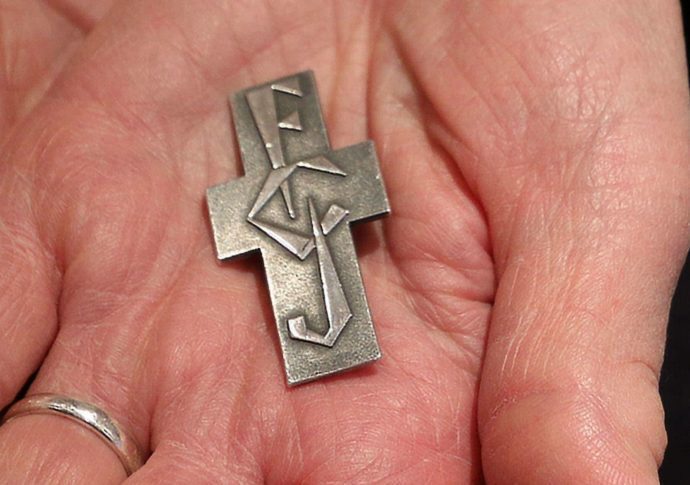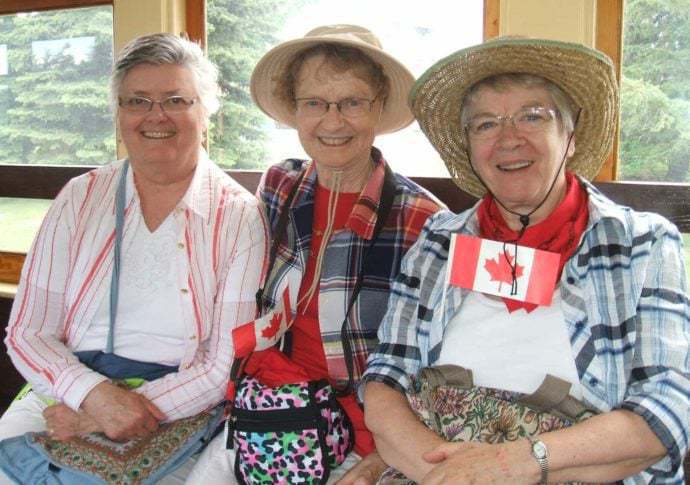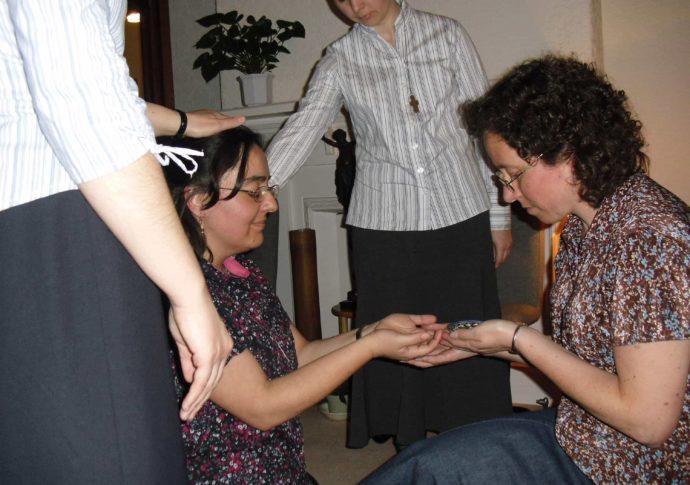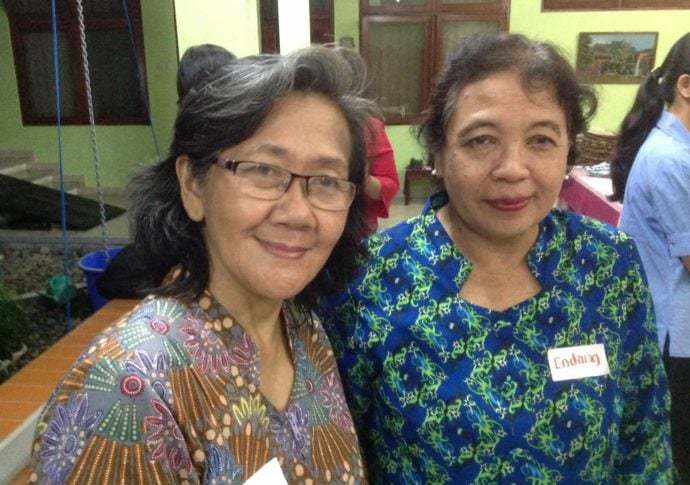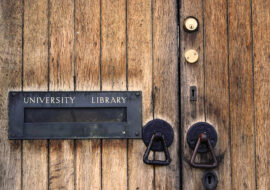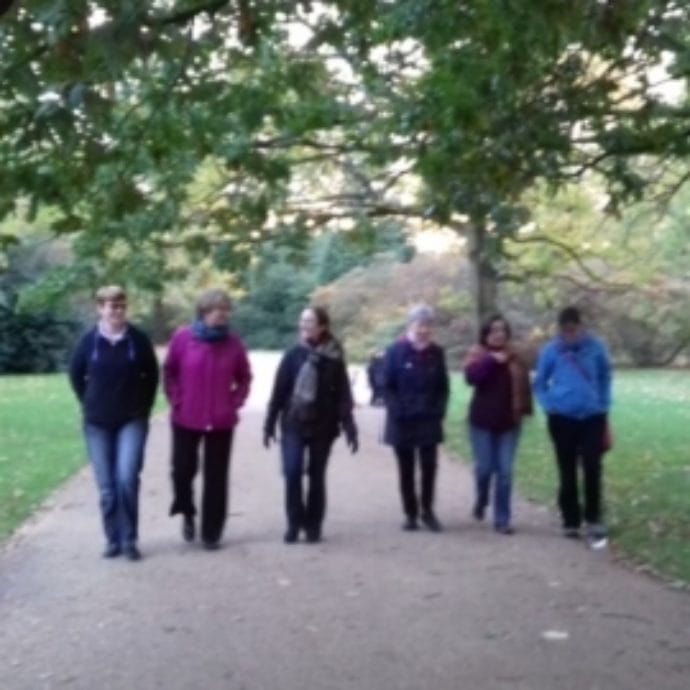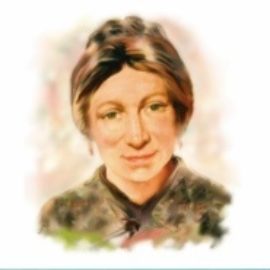A letter from Sr Claire Sykes, General Superior and Vice Postulator for the Cause of Marie Madeleine d’Houët, on the occasion of Marie Madeleine’s Feast Day, April 5th 2018
Dear Sisters,
Happy Easter! May these joyful days continue to be blessed and in particular, may 5th April be special for us all. It seems to me that Marie Madeleine’s feast-day often falls during Holy Week, so our celebrations are somewhat limited – but this year, there is no excuse. So let’s go for it!
As I think about Marie Madeleine and Easter, I realise how clearly the Formula of our Constitutions proclaims the Easter message. For example:
Like Mary, Mother of Jesus and Mother of the Church,
and like the holy women, messengers of the Good News,
we are sent to proclaim the Truth,
Jesus who is alive and lives among us,
who is Son of God and Saviour of the world.FCJ Constitutions 3
To mark our celebration of Marie Madeleine’s feast this year, I am delighted to send a translation [i] of the November 1970 document, which declared her Venerable. I don’t think a written translation was ever produced, – if it was, no one can find it! You will see that it gives a simple account of Marie Madeleine’s life and also shows so clearly how she was a messenger of the Good News.
This document proclaims Marie Madeleine’s living of virtue as heroic. It concludes,
beyond any doubt, in the case of the Servant of God, Marie Madeleine de Bengy, Viscountess de Bonnault d’Houët the theological virtues of Faith, Hope, and Charity towards God and neighbour and the cardinal virtues of Prudence, Justice, Temperance and Fortitude and other virtues associated with them, were present to a heroic degree.
It is true that ‘virtue’ is not a word we often use or hear today. However, in his audiences Pope Francis has referred several times to the theological virtues of Faith, Hope and Love and Rowan Williams, the former Archbishop of Canterbury, suggests, we would do well to reclaim the word. For the fact remains that a virtuous life is quite simply a God-centred life, a life inspired by the desire and readiness to recognise God’s presence on the road of life, even in unpromising circumstances. Virtuous people are ‘tuned in’ to that presence, and so the direction and rhythm of their lives is transformed by the energy of the Spirit. They are committed to what St Ignatius calls finding God in all things.
Virtuous people, wrote St Augustine, give us ‘lessons of encouragement’ to choose the good, to walk with them along the ‘right’ path. They leave a trail of light behind them, and by that light, we see the way we ought to go, and we feel a strong pull in that direction. Our own Marie Madeleine, who encourages us to ‘go straight to God without hesitation and by the shortest way’ (Const. 3), was one of these holy people. Even in times of suffering or distress, she clung to the belief that God was always with her, her companion and guide. Her deep faith made her attentive, alert to the signs of God’s presence in all that happened to her and to the Society, which after so many setbacks she finally founded in 1820.
In her time and milieu, Marie Madeleine lived the cardinal virtues to a heroic degree. Would it be good to ask what these virtues might look like for us in our time? Again, I quote from Rowan Williams and suggest that
- being a discerning woman of good judgement, is to live Prudence;
- showing courage without being deflected by circumstances is to live Fortitude;
- giving what is due to the individual, society and the environment, is to live Justice;
- showing emotional intelligence, understanding our desires and bringing them into self-critical awareness, is to live Temperance.
So dear Sisters, though it is a bit on the late side, let’s take time to read the 1970 declaration and let’s celebrate the heroically virtuous life of our Foundress! We might even manage some discussion on the relevance of the cardinal virtues for our day and age… If we do that, we will see that Marie Madeleine is truly a woman for our time.
With love and in companionship,
Mary Claire Sykes fcJ
General Superior
[i] Mary Murphy fcJ translated the 1970 Latin document, which was a ‘labour of love’. I am most grateful to Mary but cannot acknowledge her work without mentioning Sr Dolores fcJ. Mary Murphy knew her as superb Latin teacher at the Hollies Grammar School FCJ in Manchester. It was because of the strong foundations given by Dolores, that Mary continued Latin as a subsidiary subject at university. We can rightly say that we have the translation of the Proclamation because of Mary and Dolores. […] ‘We are standing on the Shoulders …’ God bless and keep you, Dolores!
Read the translation of the November 1970 document of promulgation, which declared Marie Madeleine to be ‘Venerable’.
Read more about Marie Madeleine, her Life, the cause for canonisation, a pilgrimage on her footsteps, the beginnings of the FCJ Society in Amiens, or find further resources about her.
Marie Madeleine Newsletter Bicentenary Issue

